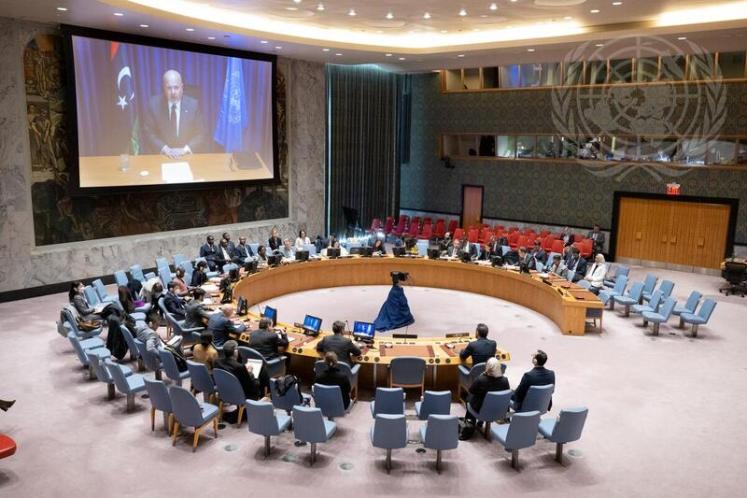Yesterday, in his most recent report to the United Nations Security Council (UNSC) on Resolution 1970 (2011), addressing the situation in Libya, Karim A. A. Khan, Prosecutor of the International Criminal Court (ICC), announced that the first steps had been taken to strengthen the capacity of the Prosecutor’s Office with regards to financial investigations.
Experts in military structures, financial investigations, and sexual and gender-based crimes have all been included in the Libya investigations team, helping to address resource constraints that have previously limited the Office’s investigative capabilities. This is critical for targeting alleged war crimes and crimes against humanity, and in the case of Libya, the systematic trafficking of migrants and refugees.
The hope now is that these improvements will produce concrete results in a process that has encountered significant challenges since the case’s referral to the ICC by the UNSC in 2011, a weakness that Prosecutor Khan has previously commented on, arguing that “situations referred by the Council cannot become never-ending stories. They need to move forward, and we need to ensure justice.”
International criminal proceedings and targeted financial sanctions
The UNSC appears to perceive financial sanctions as an effective complement to criminal proceedings. In addition to referring the situation in Libya to the ICC, for instance, Resolution 1970 orders that the assets of known traffickers (listed in Annex II of the Resolution) be frozen. Six individuals were also added to Annex II in June 2018 following UNSC Resolutions 2174 (2014) and 2240 (2015). These individuals are either explicitly designated as "leaders of a transnational trafficking network," or listed due to their central role in human trafficking and smuggling activities, such as the Commander of the Libyan Coast Guard, Abd Al Rahman Al-Milad. The explicit reference to human trafficking is unique among UNSC sanctions programs, as research from the FAST initiative, managed by UNU-CPR, has demonstrated.
The activities of these individuals go beyond the scope of other organized human trafficking activities, since they constitute an ongoing threat to peace and security in the region. Besides the sheer numbers of victims, the revenues generated by trafficking and smuggling finance conflict actors and thus fuel the armed conflict. Without these implications, it would probably not have been possible for the UNSC to impose sanctions, given that the Council’s oversight is restricted to peace and security issues by Chapter VII of the UN Charter.
The widespread acts of enslavement, sexual slavery, or enforced prostitution, could at the same time also constitute crimes against humanity or at least qualify as financially aiding and abetting war crimes and other international crimes.
The fact that the ICC might therefore have jurisdiction to investigate and judge the cases of the six sanctioned persons does not render the parallel use of sanctions redundant. Targeted financial sanctions are measures that aim to instantly restrict perpetrator activities and thus help put an end to ongoing human rights violations. A court case, involving a thorough legal assessment of offences committed in the past, would be unable to stop activities so quickly.
Criminal proceedings - including those before the ICC – also rely on the participation and cooperation of state investigative authorities. However, when a state has lost control over its territory or cannot guarantee adequate criminal proceedings, proceedings before the ICC become more difficult. Targeted financial sanctions, on the other hand, which focus on financial institutions abroad, are less dependent on the involvement of authorities and other actors in the state where crimes were committed.
The limits of financial sanctions
While sensible complementary measures, targeted financial sanctions are of course no substitute for criminal proceedings. Perpetrators must be held accountable and brought to justice. This is the only way that the international community’s condemnation of such crimes can be expressed, the harm to victims acknowledged, and the restoration of peace and reconciliation promoted. Although financial sanctions may be perceived as punishment by the individuals targeted, they are intended solely to bring about a change in the behavior of the person concerned and do not aim to punish the offence committed by that person.
Courts also help secure compensation for victims – through the court-ordered freezing, seizure, and confiscation of perpetrators’ assets – which is critically important for the survivors of human trafficking and modern slavery as it reduces their future vulnerability to these crimes. In contrast, compensating victims using assets that are frozen on the basis of sanctions, is often associated with considerable procedural and legal challenges.
More work to do – and a stronger role for the financial sector
Despite the potential, the parallel use of financial sanctions and international criminal law to pursue criminals in situations like Libya has had a very limited impact. The arrest of two key suspects in Ethiopia for crimes related to modern slavery and trafficking in Libya and their extradition to Italy and the Netherlands remain isolated successes in a process that has been ongoing since 2011. Individuals listed in resolutions continue to engage in trafficking and smuggling activities; expert interviews conducted by FAST indicate that so far not one cent of the assets owned by the six sanctioned persons have been frozen.
According to experts, the reason for this, apart from the central role of cash transactions in Libya, is the use of international offshore accounts and front companies through which enormous sums are transferred, making the tracking of these funds difficult. These methods of evading sanctions are very similar to those used in the context of money laundering. Indeed, especially in the case of the sanctioned human traffickers and migrant smugglers, a clear distinction between sanction evasion and money laundering might be difficult, since the act of concealment will often serve both purposes due to the criminal background of the persons and the assets concerned.
However, this also presents an opportunity: If financial institutions worldwide improve their capacity to detect human trafficking-related transactions in general – and Libya-related ones in particular – sanctions evasion, money laundering, and other criminal financial transactions can all be detected equally. The FAST Blueprint shows how this can be achieved. Improving the financial intelligence capacity of the global financial industry is thus crucial to strike a blow against human trafficking and modern slavery in Libya and elsewhere through the parallel system of international criminal law and targeted financial sanctions.
Formal reporting systems to relevant authorities, as well as information exchange within the framework of public-private partnerships, can ultimately provide the ICC with important financial intelligence for its investigations, and sanctions implementing authorities with the means to implement sanctions effectively.
Suggested citation: Haberstroh Frank., "Ending a ‘Never-Ending Story’: Financial Intelligence Enhances Criminal Proceedings Against Human Traffickers," UNU-CPR (blog), 2022-11-11, 2023, https://unu.edu/cpr/blog-post/ending-never-ending-story-financial-intelligence-enhances-criminal-proceedings.


